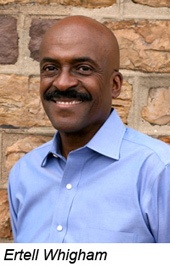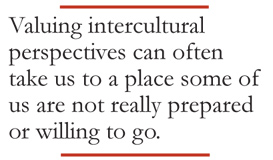Ertell Whigham
 As I read through the articles for this issue of Intersections, I was struck by the diversity of the writers and stories. While it is indeed true that many of our previous issues may have contained as much or more diversity, for some reason in this issue a spirit of intercultural representation spoke to my heart. Though there was no particular article that directly addressed intercultural fellowship as a primary focus, it was the cultural mix of names that hit home.
As I read through the articles for this issue of Intersections, I was struck by the diversity of the writers and stories. While it is indeed true that many of our previous issues may have contained as much or more diversity, for some reason in this issue a spirit of intercultural representation spoke to my heart. Though there was no particular article that directly addressed intercultural fellowship as a primary focus, it was the cultural mix of names that hit home.
In Franconia Conference we say that our core values include being missional, intercultural, and transformational. But what does it mean when we say that we value being intercultural? Or what does it mean to be intercultural or to have to do processing in intercultural ways? Many of us understand that it is more than a diversity of articles in Intersections, a tolerance of different worship styles, sharing a “mission moment,” or gathering for a special Martin Luther King time of remembrance. It is even much more than diversity. At the very heart of being the intercultural people of God is a willingness to share in the ownership of another culture as our own and being open to the Spirit of Transformation.
 Embracing intercultural as a value can be threatening, confusing, and at the very least move us to feel out of control. Valuing intercultural perspectives can often take us to a place some of us are not really prepared or willing to go. After all, who wants to be “out of control?”
Embracing intercultural as a value can be threatening, confusing, and at the very least move us to feel out of control. Valuing intercultural perspectives can often take us to a place some of us are not really prepared or willing to go. After all, who wants to be “out of control?”
Whatever the case, I believe the call to be faithful in fellowship and witness comes with the promise of being enabled. That ability, given by the spirit of God, to be the intercultural people of God in a way that demonstrates true fellowship and witness.
No matter how we approach it, the work of real intercultural fellowship can be difficult. As a work in progress, on God’s potter’s wheel, some of the things I continue to learn are:
• Intercultural work requires a secure identity in who and what you are called to be in Christ. As a result there is less chance of “losing” how and what God has designated you to be and you don’t have to work at protecting “your culture.” In his paper, Creating Intercultural Communities through Dialogue, Roberto Chene says, “Before we can engage in true intercultural relationships we must first be secure with and in our own culture.”
• It requires a personal reality check about what is most important.
• It demands open and honest expression in ways that strengthen relationships.
• It calls for an adaptability and flexibility that takes us beyond what we feel prepared for.
• It requires a spirit that understands that different isn’t wrong, it’s just different.
• It calls us beyond tolerance to an “ownership” of any expression that glorifies God.
In our conference we have included the “value” of being intercultural at the center of how we function in every aspect of what we do. As stated in the Seven Core Convictions shared by Mennonites globally, we are called to be “faithful in fellowship, worship, service and witness.”
I believe being “faithful in fellowship and witness” is one of the things that translates to our conference’s openness to the work of being intercultural. It does indeed take work. The work of the spirit and a spirit of cooperation that enables us to enjoy the process.
So, as I read the names of Detwiler, Rodriguez, Truong, Meag, Prather, Ford and others, I see the written witness of an ongoing move toward intercultural growth and I am grateful to God. Let us continue to honor that which we claim to value and surrender to that which God has called us to be.
The opinions expressed in articles posted on Mosaic’s website are those of the author and may not reflect the official policy of Mosaic Conference. Mosaic is a large conference, crossing ethnicities, geographies, generations, theologies, and politics. Each person can only speak for themselves; no one can represent “the conference.” May God give us the grace to hear what the Spirit is speaking to us through people with whom we disagree and the humility and courage to love one another even when those disagreements can’t be bridged.

Ertell, thanks for this article. I have been very impressed with the work that Franconia Conference is doing to invite and appreciate cultural diversity. It makes me proud to call FMC my home.
I hope, too, that these principles can be applied as we continue to journey with gay and lesbian members of our churches. As we live with the reality of homosexuality, may we continue to be secure in who we are as both heterosexual and homosexual people, to take reality checks about what is most important, to strengthen relationships, to move beyond what we feel prepared for, to understand that different isn’t wrong, it’s just different, and to move beyond tolerance to an “ownership” of any expression that glorifies God.
I’m trusting this conference to “turn our chairs” and see where God is working among gay and lesbian Christians, even inside our numerous congregations.
Blessings on your work,
Forrest Moyer